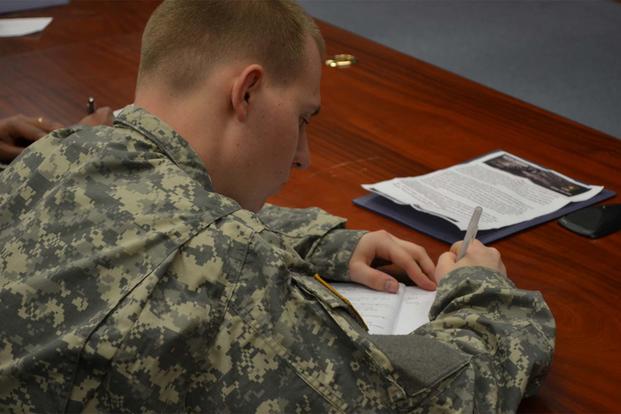The U.S. Army's senior enlisted soldier said Tuesday he hopes programs that translate training into future civilian employment credentials and college credits will help the service attract the soldiers it needs to grow its ranks.
Army leaders are scrambling to ensure the service can achieve the guidance in the National Defense Authorization Act for fiscal 2017, which calls for it to have an active force end strength of 476,000 by Oct. 1.
"I think what is monumental about this task is this is the largest increase the United States Army is going to do without the aid of tools like stop-loss or a draft," Sgt. Major of the Army Daniel Dailey told an audience at an Association of the United States Army Institute of Land Warfare Breakfast.
In addition to the active force increasing by 16,000, the Army National Guard will grow by 4,000 and the Army Reserve by 8,000, Dailey said.
The service is also offering bonuses and other incentives to ensure it meets the 6,000 increase to its retention mission, he said. But it's clear the effort will require more money in the upcoming budget for the service to bring in the additional troops, he said.
"We are going to go back and ask for more money … that is exactly what we intend to do because we have to," Dailey said.
"The NDAA didn't come with a budget increase because that budget was worked years previously, so we are ... working the request for additional funds for 2017 so we can pay the bill. We are spending money that we don't have; we are just borrowing it from the end of the year."
The educational benefits the Army offers will be a key part of its effort to attract additional soldiers, Dailey said.
"The number one reason men and women join the military today is because of sacrifice and service, and the second one is because of our education benefits," he said.
"And we will fight to sustain those benefits. ... We cannot erode benefits to our soldiers and their families or we will put the all-volunteer force at risk ... we have to continue to invest in the soldier because that is an investment in the future."
The Army will continue to focus on finding ways to convert the training soldiers receive "to real jobs in America," Dailey said.
"The NDAA this year gave us the authority to credential those soldiers who have the jobs that translate to skills in America," he said. "And that has value. Since 2008, we have dropped unemployment compensation from over $500 million a year, and it landed at around $172 million this year."
The Army's Noncommissioned Officer Education System will also give soldiers an advantage that will directly transfer to universities the Army has partnered with to ensure courses transfer for college credit, Dailey said.
This will begin when soldiers complete the Army's Basic Leader Course.
"We have already linked all of the requirements, so the only thing you should be still needing is a math, a science, and an English, which would give you an associate's degree," Dailey said.
As soldiers advance through the ranks and attend the Advanced Leader Course and the Senior Leader Course, they will earn many of the requirements for an undergraduate degree, he said.
"That way, in the future, a senior noncommissioned officer should have an undergraduate degree before they go to the Sergeant Major Academy," Dailey said.
"So I think that we have got tell America: One, we need your sons and daughters to continue to sacrifice and serve because it is the right thing to do for their nation, but two -- when we send them home, they are going to be better than when we received them, and that's our commitment to the American soldier."
-- Matthew Cox can be reached at matthew.cox@military.com.





























